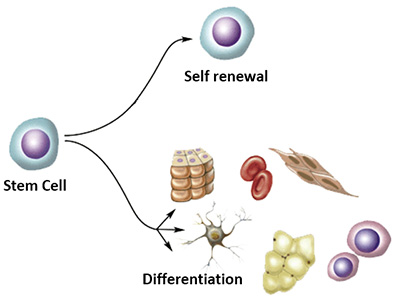 Stem cells are primitive cells that have the potential to divide and produce more stem cells (self renewal) or to differentiate into a variety of specific cell types, once they have committed to a development path that will form specific tissue or organ such as liver cells, muscle cells, blood cells, and other cells with specific functions. Stem cells are primitive cells that have the potential to divide and produce more stem cells (self renewal) or to differentiate into a variety of specific cell types, once they have committed to a development path that will form specific tissue or organ such as liver cells, muscle cells, blood cells, and other cells with specific functions.
Stem cells have the remarkable potential to develop into many different cell types in the body during early life and growth. In addition, in many tissues they serve as a sort of internal repair system, dividing essentially without limit to replenish other cells as long as the person or animal is still alive. When a stem cell divides, each new cell has the potential either to remain a stem cell or become another type of cell with a more specialized function, such as a muscle cell, a red blood cell, or a brain cell.
Stem cells are distinguished from other cell types by two important characteristics. First, they are unspecialized cells capable of renewing themselves through cell division, sometimes after long periods of inactivity. Second, under certain physiologic or experimental conditions, they can be induced to become tissue- or organ-specific cells with special functions. In some organs, such as the gut and bone marrow, stem cells regularly divide to repair and replace worn out or damaged tissues. In other organs, however, such as the pancreas and the heart, stem cells only divide under special conditions.
|
